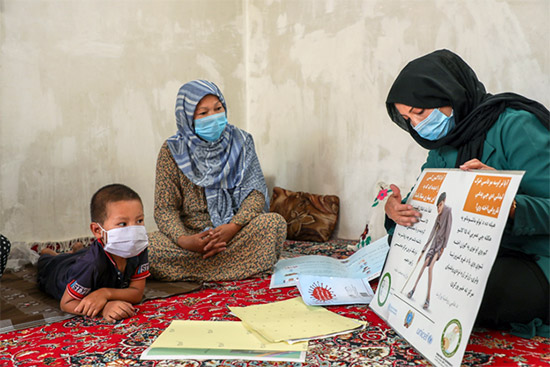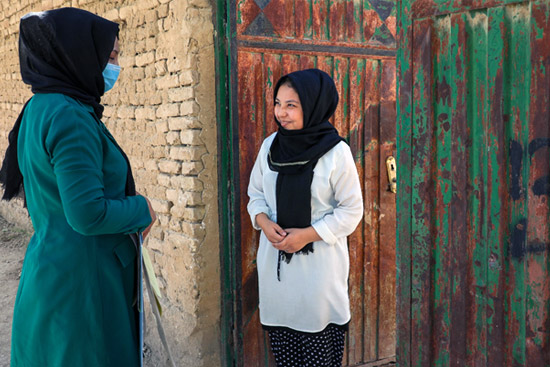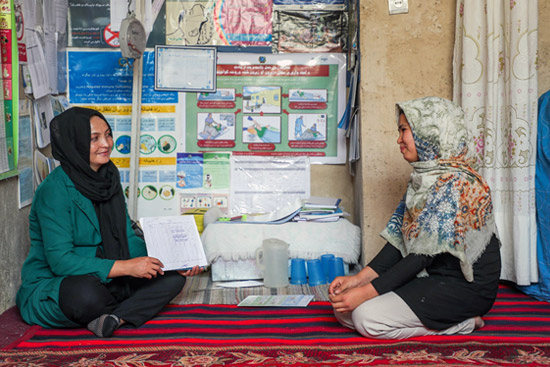Seven months since the first COVID-19 case was reported in Afghanistan, female polio programme frontline workers continue to support outbreak response. Often, they put concerns for their health to one side as they work in areas with many COVID-19 cases. Sometimes, their work brings them into conflict with the social norms of their community and society.
Nasrin Ahmadi has been working with the polio programme since 2010. Starting as a volunteer, she has moved up the ranks to become a district polio officer.
 Besides her work on COVID-19 response, Nasrin teaches women in her community about symptoms of polio and how it can be prevented. Credit: WHO Afghanistan/Roya Haidari
Besides her work on COVID-19 response, Nasrin teaches women in her community about symptoms of polio and how it can be prevented. Credit: WHO Afghanistan/Roya Haidari
Stepping up for the COVID-19 response
During the pandemic, Nasrin has taken on extra duties to identify suspected COVID-19 cases, share accurate information and trace individuals returning from abroad to ensure they are isolating.
On a typical day she heads out to speak to small groups of women about hygiene, breastfeeding, nutrition and measures to prevent COVID-19. She is the focal point for communicable diseases within her clinic, and so must also keep all her colleagues up to date on the latest information about COVID-19, alongside reinforcing knowledge about polio and the importance of vaccination.
Nasrin’s work is often emotionally challenging. “Luckily, I still have not contracted COVID-19,” she says.
“I reported seven people as I suspected that they had COVID-19, unfortunately six of them died and one of them survived and is healthy now.”
 Nasrin has overcome many gender barriers to work and study outside of her home. Now, she wishes to set an example for her daughter. Credit: WHO Afghanistan/Roya Haidari
Nasrin has overcome many gender barriers to work and study outside of her home. Now, she wishes to set an example for her daughter. Credit: WHO Afghanistan/Roya Haidari
Facing gender barriers
Nasrin has overcome many gender barriers in order to build her career. Married whilst still in school, she was lucky to be supported by her husband to complete a degree in midwifery.
Now, Nasrin feels she is setting an example to her daughter, who at 15 is on the verge of beginning her own life as a young adult.
“I want to lead by example. I also want my children to work and serve people,” she explains.
“As a woman it is not easy to work, I have been threatened and also received critiques from people who believe that women belong inside the home. However, both my husband and I believe that I have to continue to work and that my work is important to save the lives of women and children. I have struggled to keep my job and I have worked against all odds.”
 Nasrin takes a leading role sharing health information with local women through her role as a District Polio Officer and midwife. Alongside thousands of her colleagues, she has devoted the last seven months to mitigating the effects of COVID-19. Credit: WHO Afghanistan/Roya Haidari
Nasrin takes a leading role sharing health information with local women through her role as a District Polio Officer and midwife. Alongside thousands of her colleagues, she has devoted the last seven months to mitigating the effects of COVID-19. Credit: WHO Afghanistan/Roya Haidari
A programme effort to respond to COVID-19
Ever since the first case of COVID-19 was reported in Afghanistan, the Polio Eradication Initiative (PEI) programme has been supporting the government response.
Since March 2020, nearly 36 000 members of the Polio Surveillance Network, almost 48 000 polio frontline workers, almost 99 000 health providers and about 5000 government and NGO staff have been trained on COVID-19 surveillance. Nearly 186 000 community and religious influencers have been trained to deliver outreach messages, and almost 7000 coordination meetings have been held.
Nearly 10 000 COVID-19 and polio surveillance visits have been made to health facilities, and more than 2500 medical facilities have been surveyed for COVID-19 preparedness. Thanks to the efforts of the polio team, over 48 000 cases of COVID-19 have been detected, of which more than 8000 have been confirmed.
Nasrin shares with her colleagues a sense of duty to her fellow citizens. She says, “I go out hoping that my work might save lives. If I stay home, who will give the information to people that I do?”


